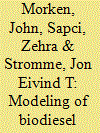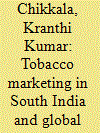| Srl | Item |
| 1 |
ID:
145051


|
|
|
|
|
| Summary/Abstract |
The safeguarding of heritage is touted as an important step in protecting cultural diversity. The emphasis heritage projects put on preservation, however, obscures the part they play in transformation. This article argues that heritagization can be viewed as a kind of Bildung that draws diverse practices tied to diverse worldviews and value systems into a space of equivalency and civil society, amenable to capitalist social relations. Drawing on research on a Hungarian folk revival movement, the article calls for comparative research on how heritagization depoliticizes the very effects of neoliberal capitalism that it addresses and offers solutions that may be tied to dispossession.
|
|
|
|
|
|
|
|
|
|
|
|
|
|
|
|
| 2 |
ID:
124154


|
|
|
|
|
| Publication |
2013.
|
| Summary/Abstract |
This study presents a model of an ecotechnology that combines algae cultivation with anaerobic digestion in order to recycle nutrients and to reduce the need for external energy. The concept is to convert organic waste into several products, such as electricity, biodiesel and organic fertilizer. It is labeled as the ACAD biorefinery. The simulation model of the ACAD biorefinery proved itself to be a powerful tool for understanding the symbioses and dynamics of the system, and therefore also a good tool for reaching political decisions. The model shows that the ACAD biorefinery could be totally independent of external energy supplies. Energy calculations indicate that more energy can be produced by combining the algae cultivation and anaerobic digestion processes. For every unit of energy entering the system in feedstock, 0.6 units of energy are exported as either biodiesel or electricity. The exported electricity accounts for approximately 30% of the total exported energy, while the remaining 70% is exported as biodiesel. By producing its own energy, the biorefinery improves its renewability and level of carbon neutrality.
|
|
|
|
|
|
|
|
|
|
|
|
|
|
|
|
| 3 |
ID:
128879


|
|
|
|
|
| Publication |
2014.
|
| Summary/Abstract |
This article outlines macro-structures of tobacco production and marketing, mainly in Andhra Pradesh, taking a historical perspective. It discusses the emergence of a depot and auction system and other strategies to create more effective marketing conditions for this attractive but highly perishable agricultural produce. Identifying numerous management problems in tobacco leaf marketing, and responding to some indications of crisis, the article also highlights the potential for the emergence of an upper stratum of tobacco growers and their agents, as well as satisfactory employment conditions and more equitable participation of many stakeholders in the tobacco industry, including Dalits and women.
|
|
|
|
|
|
|
|
|
|
|
|
|
|
|
|